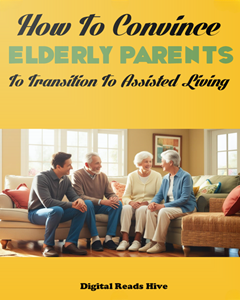Recognizing when a loved one or parent may need additional support is an important step in ensuring their safety, happiness, and quality of life.
Small changes in their daily routines, behavior, or physical abilities might indicate that they would benefit from a more structured and supportive environment.
Knowing what to look for can empower you to make thoughtful decisions that prioritize your loved one's well-being while easing your concerns.
Take a closer look at these 12 essential signs to better understand when assisted living might be the right choice for your family.
1)) Frequent Falls
Frequent falls indicate that it may be time to consider a new living arrangement for your parents.
These incidents not only pose a significant risk to their physical health, such as broken bones or head injuries, but they can also impact their emotional well-being, leading to fear, anxiety, or a loss of confidence in their mobility.
Often, falls result from a combination of factors like impaired balance, reduced strength, or hazards within the home environment that are difficult to manage effectively without continuous support.
Assisted living communities are equipped with trained staff and safety measures to help reduce these risks, providing a secure and supportive environment where your parents can move freely and regain their sense of independence.
By addressing these concerns proactively, you ensure their safety while allowing them to maintain a fulfilling and more active lifestyle.
2)) Wandering Or Getting Lost
When elderly parents start to display behaviors such as wandering or frequently becoming disoriented, it may indicate the need for a more structured and secure living environment.
These situations can present significant safety risks, particularly if they venture outside and are unable to find their way back or encounter hazardous situations.
Assisted living communities provide a safe and supervised setting where such risks are minimized, ensuring their well-being at all times.
These communities also offer specialized care for those with memory or cognitive challenges, creating an environment that fosters comfort and reassurance.
Moving to assisted living can provide peace of mind for family members, knowing that their loved ones are under professional care while still being able to engage in meaningful activities and social interactions.
3)) Poor Personal Hygiene
When an elderly loved one begins to show a noticeable decline in their hygiene, it can indicate a deeper issue that requires attention.
Simple routines like bathing, grooming, or wearing clean clothes may become challenging, either due to physical limitations, cognitive decline, or lack of energy.
These changes can sometimes be subtle at first but may escalate over time, leading to concerns about their overall health and well-being.
Addressing this issue in a compassionate and supportive manner is vital, as it allows you to better understand the challenges they face while ensuring their dignity remains intact.
Professional care environments can provide essential assistance in maintaining personal hygiene, promoting both physical health and emotional stability for aging individuals.
4)) Unmanaged Medical Conditions
Unaddressed medical conditions can be a significant indicator that it may be time for your parents to transition to an assisted living environment.
Managing chronic illnesses, medications, and regular health checkups often becomes more challenging as individuals age.
Missing appointments, forgetting to take prescribed medications, or neglecting essential treatments could lead to a rapid decline in overall health.
Assisted living facilities provide professional staff who are available to monitor and manage health needs effectively, ensuring that your loved ones receive the care they require.
These facilities create a supportive environment where regular medical attention and prompt interventions are part of daily life, thereby reducing the risk of complications and promoting a higher quality of life.
Recognizing these signs early can help ensure your parents’ safety and well-being as they continue to age gracefully.
5)) Social Isolation
Social isolation can have significant negative effects on the mental, emotional, and even physical health of aging parents.
When older adults become increasingly withdrawn or disconnected from their friends, family, or community, it may be a sign that they are struggling to maintain their social connections independently.
This can lead to feelings of loneliness, depression, and a decline in cognitive abilities.
Assisted living communities provide an environment that fosters social interaction and engagement, offering access to group activities, events, and shared dining experiences.
By being part of such a vibrant community, your parents can form meaningful relationships, stay mentally stimulated, and regain a sense of purpose and belonging.
Recognizing social isolation as an important signal is a key step in ensuring your loved ones live a happier and healthier life.
6)) Difficulty Managing Finances
Managing finances can become increasingly challenging as people age, often leading to missed bill payments, poor budgeting, or confusion over accounts and expenses.
These difficulties can cause undue stress and potentially lead to financial instability, debt, or even vulnerability to fraud.
It is important to pay close attention to this behavior, as it signifies that your parents may need more structured support to handle their affairs effectively.
By addressing these challenges early, you can help them avoid significant financial hardships and ensure their well-being.
This decision should always be approached with care, sensitivity, and an open dialogue to respect their independence while providing the assistance they need.
7)) Unsafe Living Environment
When an individual’s living space begins to pose safety concerns, it often becomes a crucial factor in evaluating their overall well-being.
Hazards such as poor lighting, loose carpets, or lack of accessibility features can increase the risk of accidents, especially for older adults who may face mobility or balance challenges.
Issues like difficulty maintaining cleanliness, neglected home repairs, or improper storage of medications can create further dangers and stress.
Ensuring a safe and supportive environment is essential not only for physical health but also for emotional peace of mind, both for the individual and their family members.
Addressing these concerns proactively can help prevent injuries and provide the reassurance that their daily needs are being met in a setting designed to support their safety and comfort.
8)) Decline In Mobility
A noticeable decline in mobility can significantly impact the safety and quality of life for aging parents, making it a crucial factor to consider when evaluating their living arrangements.
Reduced mobility often leads to increased vulnerability to falls and injuries, especially if their current home lacks accessibility features like grab bars or stairlifts.
Difficulty in navigating their living space can limit their independence and daily activities, which may affect their physical and emotional well-being.
Assisted living communities are designed with these challenges in mind, offering environments that promote safety and ease of movement.
With access to support services, opportunities for physical therapy, and social engagement, these communities can help seniors maintain a better quality of life while reducing the risks associated with decreased mobility.
9)) Forgetting To Eat Or Cook
Forgetting to prepare meals or not eating regularly can indicate a decline in your parents' ability to care for themselves, which may signal the need for a transition to assisted living.
Proper nutrition is essential for maintaining energy levels, cognitive function, and overall health, yet it is often one of the first areas to be affected as individuals age and face challenges such as memory loss or reduced physical capabilities.
Assisted living communities provide access to consistent, well-balanced meals designed to meet dietary needs, ensuring that residents stay nourished and healthy.
These environments often encourage structured meal times, which can help foster a sense of routine and promote social connections during shared dining experiences.
Recognizing these signs early can lead to positive changes that significantly enhance the safety and well-being of your loved ones.
10)) Missed Medications
Missed medications can be a critical indicator that moving to an assisted living community might be a necessary step for your parents.
Proper medication management is vital for maintaining health, particularly for seniors who may have multiple prescriptions or specific dosing requirements.
Forgetting doses or taking the wrong pills can lead to severe health complications, from worsening chronic conditions to dangerous drug interactions.
Assisted living facilities provide professional support to ensure medications are administered correctly and on time.
This reliable oversight not only prevents potential errors but also gives peace of mind to family members who may not always be available to monitor compliance.
By addressing this issue in a supportive and proactive way, it’s possible to create a safer environment where your parents can thrive.
11)) Increased Caregiver Burnout
When caregiving responsibilities become overwhelming, it can take a significant toll on the mental, emotional, and physical well-being of the caregiver.
This level of stress may lead to feelings of exhaustion, frustration, and even resentment, which can strain the relationship between the caregiver and their loved one.
Recognizing these signs is crucial, as they indicate that additional support and resources are necessary to ensure the well-being of both parties.
Prioritizing such changes can help alleviate the burden on caregivers while ensuring that elderly parents continue to receive the attention and care they deserve.
By acknowledging and addressing these challenges, families can work toward maintaining a healthy dynamic and improving the quality of life for everyone involved.
12)) Hoarding Tendencies
Hoarding tendencies can indicate that your aging parents may need additional support and a safer environment to thrive.
When excessive clutter begins to take over their living space, it can pose significant risks, including tripping hazards, unsanitary conditions, and limited access to essential areas like the kitchen or bathroom.
Beyond the physical dangers, hoarding can often be tied to deeper emotional or psychological struggles, such as feelings of isolation, stress, or an inability to manage daily responsibilities.
Moving to assisted living can provide a structured and caring environment where they can receive the help they need, both in terms of physical safety and emotional well-being.
Professional caregivers can assist in creating a clutter-free, organized space while offering compassionate support to help your parents feel secure and cared for.
Making this transition could greatly improve their quality of life and ensure they remain happy and healthy in their golden years.

Transitioning elderly parents to assisted living can be a challenging conversation, but this short guide provides invaluable advice with practical tips and empathetic approaches. Learn how to overcome common objections, foster collaboration, and ensure your loved ones’ happiness and safety. Take the next step today—purchase the e-book to gain the tools you need to make this life-changing decision stress-free and informed.
Conclusion
Supporting your aging parents through life’s transitions is a profound opportunity to give back to those who have cared for you.
By addressing their physical, emotional, and environmental needs, you can foster an environment where they feel safe, valued, and comfortable.
Taking steps to reduce hazards, organize their living space, and provide access to professional caregiving can ease the challenges they may face.
Equally important is maintaining open and compassionate communication to ensure they feel heard and respected during this phase of life.
Related Articles and Guides:
- Top 10 Questions To Ask When Touring Assisted Living Facilities
- 6 Key Benefits Of Assisted Living For Seniors And Their Families
- 5 Emotional Challenges Families Face During The Transition To Assisted Living
- 7 Myths About Assisted Living Debunked
- 7 Key Differences Between Assisted Living And Home Care
Download Our Free E-book!








